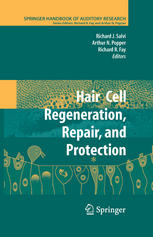

Most ebook files are in PDF format, so you can easily read them using various software such as Foxit Reader or directly on the Google Chrome browser.
Some ebook files are released by publishers in other formats such as .awz, .mobi, .epub, .fb2, etc. You may need to install specific software to read these formats on mobile/PC, such as Calibre.
Please read the tutorial at this link: https://ebookbell.com/faq
We offer FREE conversion to the popular formats you request; however, this may take some time. Therefore, right after payment, please email us, and we will try to provide the service as quickly as possible.
For some exceptional file formats or broken links (if any), please refrain from opening any disputes. Instead, email us first, and we will try to assist within a maximum of 6 hours.
EbookBell Team

4.8
14 reviewsThe sensory hair cells in the inner ear and vestibular system convert mechanical stimuli, sound and motion into neural activity that is responsible for the sensations of hearing, motion and head position. In mammals, the loss of hair cells from acoustic overstimulation, ototoxic drugs and aging is irreversible, leading to a permanent loss of function. However, it is now clear that hair cells in other vertebrates are capable of regenerating and recovering partial or complete function. Moreover, partially damaged hair cells can undergo self-repair or be protected from traumatic insults by external compounds.
Hair Cell Regeneration, Repair, and Protection provides a comprehensive survey of what is currently known about the regeneration, repair and protection of sensory hair cells and subsequent recovery of function in the auditory and vestibular system. The aim is to provide graduate students, postdoctoral fellows, clinicians and scientists in related disciplines with the biological bases of hair cells and with an understanding of the factors that contribute to their regeneration and repair.
Table of Contents:
About the editors:
Richard J. Salvi, Center for Hearing and Deafness, University of Buffalo, NY. Arthur N. Popper is Professor in the Department of Biology and Co-Director of the Center for Comparative and Evolutionary Biology of Hearing at the University of Maryland, College Park. Richard R. Fay is Director of the Parmly Hearing Institute and Professor of Psychology at Loyola University of Chicago.